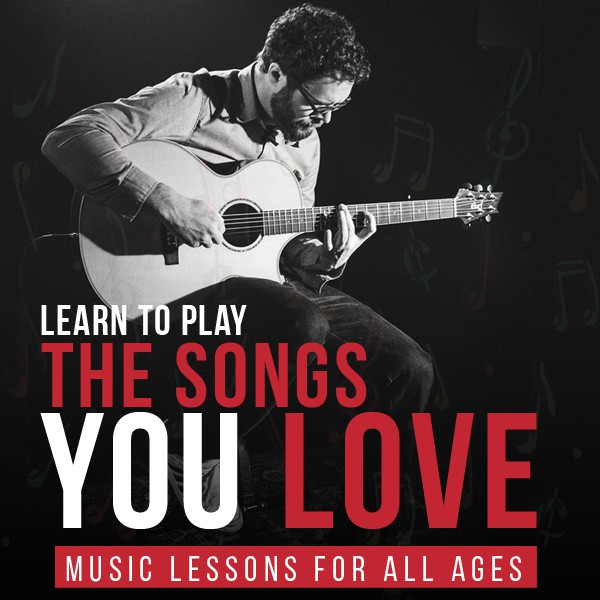Few things on this entire planet are better for a child than learning to play a musical instrument. Studies of every age group show benefits ranging from better communication skills to improved muscular coordination to something simple yet truly profound…
Kids who play music smile more.
Music instruction can begin at any age and have dramatic impacts. Even adults learning an instrument after the age of 50 have been found to maintain better memory function and higher levels of happiness going into older age.
At the other end of the age spectrum, a groundbreaking study at McMaster University showed that infants who learn music before even walking and talking are given a huge head start in universal life skills and emotional health.
The infants, with their parents, were broken up into two classes. One class involved interactive music-making in which the babies and their parents worked together to learn percussion instruments and play lullabies, nursery rhymes, and songs with actions; in the other class, infants and parents played with toys together while recordings of the “Baby Einstein” series played in the background.
Researchers were stunned at the differences between the two groups of babies.
“Babies who participated in the interactive music classes with their parents showed earlier sensitivity to the pitch structure in music,”
Laurel Trainor, director of the McMaster Institute for Music and the Mind, told Science magazine.
“Specifically, they preferred to listen to a version of a piano piece that stayed in key, versus a version that included out-of-key notes. Infants who participated in the passive listening classes did not show the same preferences.”
But the differences went far beyond musical comprehension. The babies who’d learned to play with music communicated more effectively, pointing to objects they could not reach and waved goodbye. They smiled more, were soothed more easily, and were less frustrated when things were unfamiliar or didn’t go their way.
The significance of this study was in showing just how fundamentally beneficial learning to play music is in child development. Think about it: before a child can walk, he or she can learn music, and through it learn essential life skills. If music is this powerful this young, the benefits of learning how to play more elaborate music and musical instruments later in childhood are equally impactful.
There’s a huge body of scientific literature that demonstrates how learning an instrument as a child offers lifelong benefits. Today we’ll just look at three broad categories of benefits children receive from learning an instrument: better emotional health, greater mental capacity, and more refined physical skill.
Music and emotions
Consider what is required of a musician in the course of a five minute song. Physical and mental engagement are essential, of course, but even more fundamental is the emotional engagement — not only with the mood of the music, but with one’s own emotions.
By playing an instrument, children can better learn not only to be in touch with a broad swath of emotions, but to control their own emotions — such as anxiety and nervousness. The focus learned in music plays out throughout life. Research has shown that music education increases overall emotional intelligence — that is, the ability to recognize and interpret our own and other people’s emotions.
Music and the brain
Study after study shows how dramatic and positive the impacts of learning music are for a child’s brain. Music touches nearly all significant spheres of neurological activity, but a key aspect is what scientists call the brain’s “plasticity” — that is, the core function of our ability to change ourselves or, put more simply, to learn. This plays out in many ways.
When children learn to play music, their brains begin to hear and process sounds they otherwise likely wouldn’t even hear. This develops “neurophysiological distinction” between certain sounds that can aid in literacy, which then results in improved academic performance.
As reported by TIME, a study from Northwestern University showed that to fully obtain the cognitive benefits of a music class, kids can’t just sit there and listen to music; they have to be actively engaged in the music and participate in the class.
In other words, they need to play an instrument.
“Even in a group of highly motivated students, small variations in music engagement, attendance and class participation predicted the strength of neural processing after music training,”
said Nina Kraus, director of Northwestern University Auditory Neuroscience Laboratory. “It turns out that playing a musical instrument is important.”
Music and muscles
Musical instruments help children develop coordination and motor skills. Playing music requires movement of the hands, arms, and feet, often in timing with external stimulus, such as other musicians, or internal measures, such as simply keeping time. No other species on earth is capable of such sophisticated movement, and music is one of the ways we best learn to refine such motor skills in our early learning.
String and keyboard instruments, like the violin and piano, require different actions from your right and left hands simultaneously. According to a study published the Neurosciences and Music journal, learning a musical instrument enhances a child’s ability to use small, acute muscle movements to write, use a computer, and perform other physical tasks, such as sports.
Get started sooner than later
A child learning an instrument tends to be more emotionally stable, better at learning, and more finely physically adept.
If you are a parent considering getting your child started on an instrument, what are you waiting for?

















